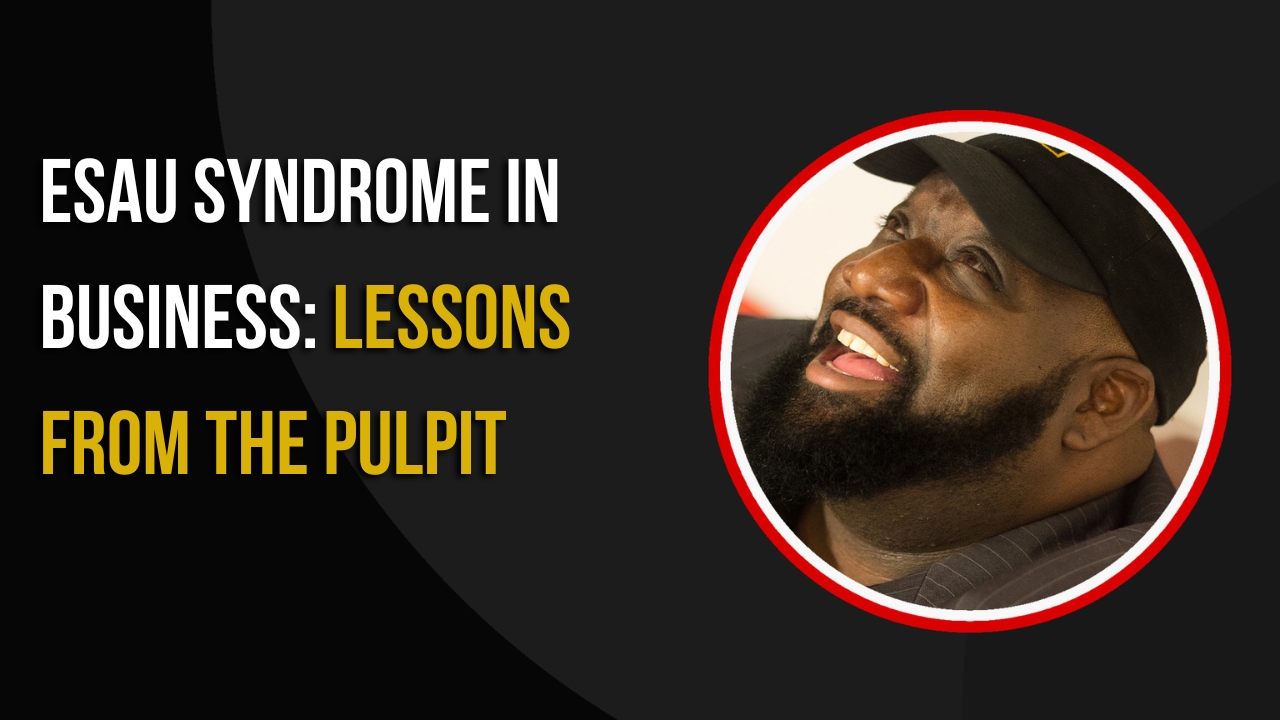
23 Oct Esau Syndrome in Business: Lessons from the Pulpit
Yesterday in church, the pastor preached a message entitled "Your Birthright and the Ballot Box"—a powerful parallel between Esau giving up his birthright for a "bowl of red stew" and how many people today are neglecting their right to vote over "trivial" issues. He highlighted how some choose not to vote because they believe their vote doesn’t count or because of seemingly minor inconveniences.
But what struck me most was his mention of The Esau Syndrome, a concept that got me thinking not only from a theological and sociological perspective but, of course, from a business perspective.
In business, Esau Syndrome manifests when leaders, entrepreneurs, or employees sacrifice long-term growth or sustainability for short-term gains. This happens more often than we think, and the consequences can be just as devastating as Esau’s story in the Bible.
Let’s break it down into several key areas where Esau Syndrome can harm businesses:
1. Short-Term Profits vs. Long-Term Sustainability
Many businesses are driven by the pressure to meet quarterly earnings goals. As a result, decisions that boost immediate profit margins often harm the company’s future. This can involve cutting corners on product quality, under-investing in innovation, or overworking employees. Businesses caught in Esau Syndrome mode might slash R&D budgets to show profitability for a single quarter, but miss out on the innovations that would sustain them in the long run.
Example: A company might launch a product that meets immediate market demand but lacks the quality to sustain customer loyalty, leading to a long-term loss of brand trust.
2. Undervaluing Assets for Quick Sales
Sometimes, entrepreneurs or business owners sell assets, divisions, or even the entire business at a low valuation to gain quick liquidity. Financial pressures or market volatility can cause panic, pushing owners to settle for less than the true worth of their asset.
Example: A startup founder might sell their company too early in exchange for a quick exit, missing out on long-term market dominance and the exponential returns that come with it.
3. Burnout for Immediate Success
The rush to achieve short-term goals can lead leaders to push their teams too hard, causing burnout. While this might seem productive as projects get completed and targets are hit, over time, the business suffers from high turnover, low morale, and lost institutional knowledge.
Example: A company that drives its workforce to meet an ambitious sales goal may celebrate short-term success, but if burnout causes key talent to leave, the business’s long-term operational capacity diminishes.
4. Compromising Business Integrity for Fast Wins
In the race for fast results, some businesses might cut ethical or legal corners. While this may temporarily boost revenue, it erodes trust over time, damaging the company’s reputation and sustainability.
Example: A business might falsify financial records or make deceptive claims in its advertising to attract investors quickly, only to face legal consequences and public backlash later.
5. Instant Gratification in Decision-Making
Entrepreneurs or leaders sometimes take on too many projects or rush product launches to show productivity. This impatience spreads resources too thin, leading to subpar products that damage the brand.
Example: A company might prematurely expand into new markets without fully understanding customer needs or building a solid infrastructure, resulting in costly failures.
Strategies to Avoid Esau Syndrome in Business
To mitigate Esau Syndrome, businesses must adopt a long-term mindset, maintaining discipline even when the allure of quick wins is strong. Here are key strategies to avoid falling into this trap:
Delayed Gratification Mindset: Cultivate a culture where the focus is on building systems and products that will pay off in the long term, rather than rushing for immediate results.
Investment in the Future: Reinvest profits into R&D, talent development, and infrastructure, even if this means forgoing larger short-term profits. Sustainable growth depends on it.
Ethical Boundaries: Establish non-negotiable ethical standards, even when breaking them might offer a tempting short-term win. Integrity is critical to long-term success.
Strategic Risk Management: Avoid panic selling of valuable assets by maintaining a solid cash flow strategy, ensuring that decisions are made from a place of stability rather than fear.
Balanced Workload: Ensure both leaders and employees pace themselves to avoid burnout, balancing immediate targets with sustainable workload management.
The Takeaway: Don’t Trade Your Business Birthright for a “Bowl of Stew”
Just as Esau regretted his decision to trade away his birthright for a fleeting moment of satisfaction, businesses too can fall into this trap when they sacrifice long-term potential for short-term gains. Whether it’s undervaluing assets, overworking teams, or making hasty decisions, the effects of Esau Syndrome can be devastating if not checked.
By adopting a mindset of patience, reinvesting in the future, and maintaining ethical boundaries, businesses can protect their “birthright”—their long-term success and legacy.

